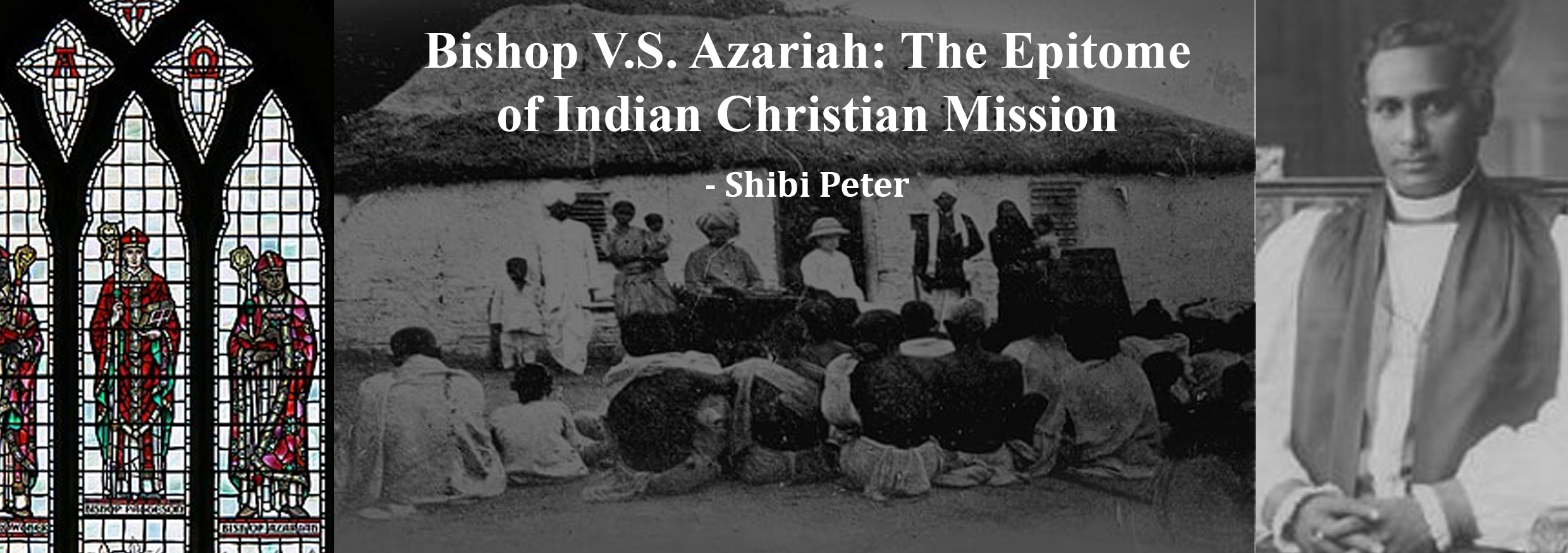– Shibi Peter
1st of January marks the 79th death anniversary of the historical figure, Bishop V.S. Azariah! When Bishop Vedanayagam Samuel Azariah bid adieu on New Year’s Day in 1945, he had already become one of the most influential personalities in the global Christian community through his extraordinary life. December 29th, 2023, marked the 111th anniversary of his ordination as the first Indian bishop in the Anglican community. The 150th birth anniversary of Bishop Azariah will be celebrated on August 17, 2024.
A social reformer who shaped the Indian national movement with his radical ideas, the founder and dedicated practitioner of indigenous missionary movements, an intellectual who defined global ecumenical movements through his vision and action, a visionary who laid the foundation for the formation of the Church of South India Bishop V.S. Azariah’s life can be described with many such adjectives. However, in a single word, Bishop Azariah is synonymous with Christian mission.
Born in 1874 in Vellalanvilai village, Tirunelveli, Bishop Azaria’s seven-decade-long life has been a direct testimony to Indian Christian theology, the Church of South India, and the indigenous missionary movement. While summarising his long and impactful life on a brief note is a challenge, it’s clear that Bishop Azariah’s vision and mission offer valuable insights to address the contemporary challenge and guide the faith journey of the Church today.
Tirunelveli is a beacon in the landscape of Indian church history
Tirunelveli is a beacon in the landscape of Indian church history, illuminating the path of early missionary endeavors. The Church Mission Society began its work in Tirunelveli in the early decades of the nineteenth century, and it became a mass movement in the 1830s. The cracks created in the Hindu social order and the emerging movements for social equality among lower castes made the mission work complicated. In the 1940s, there was a mass conversion from the Shanar (Nadar) community, which led to the formation of a unique identity for Tirunelveli Christians. Bishop Azariah’s father, Thomas Vedanayakam, was a person who converted in this historical context. He was an ordained presbyter in the Tirunelveli Evangelical Anglican Church Missionary Society.
Bishop Azariah’s formative years as a student at the Madras Christian College played a crucial role in shaping his ecumenical leadership. It was during this time that he became involved with the YMCA and the Student Volunteer Movement (later the Student Christian Movement). Bishop Azariah, who was also the first Indian secretary in the history of the YMCA, worked in its national and international capacities for nearly fourteen years. The legendary figures like K.T. Paul, S.K. Datta, B.C. Sarkar, and Augustine Rallaram were also the contributions of the SCM-YMCA movements during the same period.
Bishop Azariah’s radical contribution to Indian missionary history
Bishop Azariah’s radical contribution to Indian missionary history lies in his championing of indigenization. He believed that the church in India should be shaped by its local context, not solely by Western models. A landmark event was the founding of the Indian Missionary Society of Tirunelveli in 1903, inspired by the missionary movement of Tamil Christians in Ceylon. Through the IMS, Azariah launched his first mission work in Dornakal.
The concept of a national Indian church paralleled the rise of Indian nationalism. The Indian Political Association (1876) and the Indian National Congress (1885) had already sown the seeds of a national identity. This led to the formation of several indigenous Christian associations, such as the National Church of Madras (1886) and the Madura Home Missionary Society (1904). It was within this context of burgeoning national consciousness that the National Missionary Society (NMS) was formed on Christmas Day in 1905.
Bishop Azariah (1906–1909) was the founding leader and first General Secretary of the National Missionary Society (NMS). The church unity efforts led by Bishop Azariah and others, including K.T. Paul, laid the foundation for the formation of the Church of South India. The history of Christian Ashram movements is also not different from this. Bishop Azariah’s interventions in defining the parameters of ecumenism at the Edinburgh Conferences of 1910 and 1939 were historic. As David Carter points out in his book ‘The Ecumenical Movement in Early Years’, ‘when the World Council of Churches was formed in 1948, it had only one achievement to declare: the formation of the Church of South India’. Bishop Azariah’s commitment to ecumenism stemmed from his deep roots in the missionary movement. His unwavering dedication to indigenization, church unity, and social justice continues to inspire Christians in India and across the globe. Vedanayagam Samuel Azariah, a pioneering figure in Indian Christianity, played a central role in shaping its trajectory during the early 20th century.
Bishop Azariah served as the first president of the National Christian Council of India (NCCI) from 1923 to 1945. His tenure marked the renaming of its official journal, ‘Harvest Field’, to ‘NCC Review’ in 1924, which celebrates its centenary in 2024.
Tweet
In 1909, Bishop Henry Whitehead ordained Samuel Azariah as a deacon. Later, in 1912, Azariah’s historic ordination as the first Indian bishop in the Anglican Communion took place, despite facing opposition from both Indian and foreign missionaries. The ceremony was attended by Dr. John R. Mott and Sherwood Eddy, who had been lifelong mentors and inspirations to Azariah. He then assumed the role of assistant bishop of the Dornakal Diocese. In 1916, at the invitation of the newly ordained Bishop Azariah, the Anglican Church Men’s Union began mission work in Parkal. This year (2024) marks the centenary of the Parkal Mission (1924-2024).
The book ‘Christ in the Indian Villages’, co-authored by Bishop Azariah and Bishop Henry Whitehead in 1930, is considered the first book to identify the socio-cultural context of mission work. In its introduction, Dr. John R. Mott states that nine out of ten people in India at that time lived in poor villages. Bishop Azariah and Bishop Henry Whitehead based their mission work on the available social and economic data from these villages. Bishop Azariah’s missionary vision was rooted in social justice. It brought about radical changes in the social lives of the people, and hence they had to face political challenges. Mahatma Gandhi had described Bishop Azariah, who stood for the indigenization of the Christian mission and the Indian National Church, as his ‘first enemy’. This was because Gandhi feared the impact that the conversion of lower-caste people would have on the Hindu social order.
As Sister Carol Graham noted, Azariah believed that Christian witness must translate into tangible improvements in people’s lives. Additionally, J.Z. Hodge described him as the ‘Apostle of Church Unity’ in his biography, ‘Bishop Azariah of Dornakal’ (1946). Bishop Azariah has a prime place among those who witnessed Christ on Indian soil through his extraordinary life. His life was a vision and practice that transformed mission into a mass movement and differences into a church. That blessed life is also a remedy for the crises of the institutionalized church today and for the mission concepts that have been treated as mere charity.

Mr. Shibi Peter
Shibi Peter is an independent research scholar and activist based in Nagpur. He had worked with several ecumenical organizations like SCMI and NCCI. Currently he’s working as the Director of Socio-Economic Development Service and serves Kerala Council of Churches as it’s Vice- President.
References
- A Brief History of Missions in Tirunelveli, Rev. Dyron B. Daughrity
·• The Tinnevelly Shanars : A Sketch of their religion,and their Moral condition and characteristics, as a caste Rev. R. Caldwell - Bishop V.S. Azariah: A Profile, M.M. Thomas (1998)
- The Legacy of Bishop V.S. Azariah A.J. Appasamy
- Christ in the Indian Villages, VS Azariah, Henry Whitehead (1930)
- In the Shadow of the Mahatma: Bishop V. S. Azariah and the Travails of Christianity in British India, Susan Billington Harper (2000)
- Azariah of Dornakal, Carol Graham (1946)
- Bishop Azariah of Dornakal, JZ Hodge, (1946)
- Bishop VS Azariah: A Life in Indigenisation A.R. Chelliah (2016)
